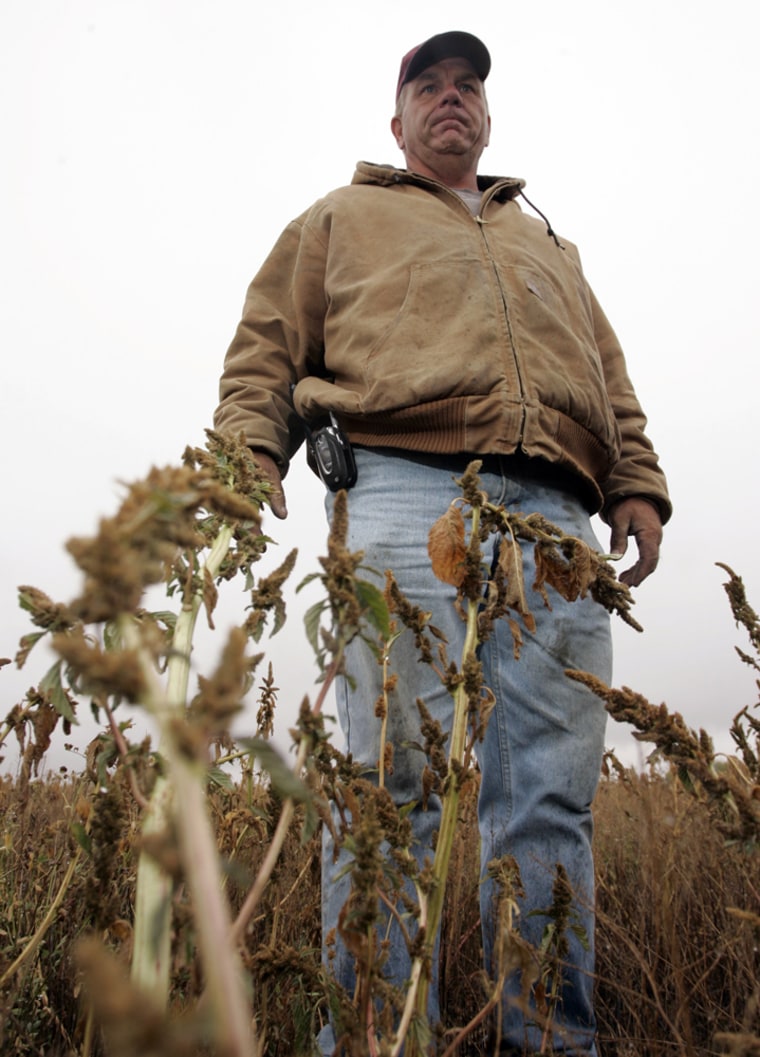Many farmers in this northern Colorado plains region are struggling to keep their crops irrigated and stay afloat as they find themselves on the wrong side of state water rules dating back to the 19th century.
The farmers around Wiggins, population 830, recently lost a lengthy war over access to the nearby South Platte River.
To make ends meet, several of them banded together for a recent auction to raise money: combines, tractors, vintage trucks and piles of rusted scrap metal, all arranged in rows, waited to be gobbled up by buyers amid a cloud of dust hanging over the auction site.
"I've been auctioneering for 31 years. I've had the opportunity to call auctions for many different reasons — retirement, just broke. This is the most uncalled for, sad situation I've ever seen in my life," said auctioneer Chuck Miller.
The farmers' plight traces back to the late 1800s, when reservoir and ditch companies bought senior rights to the Platte. Some 30 years later, farmers drilled their first wells in the South Platte River Valley.
Water in Colorado is first come, first served. State law requires well users to have a supply of replacement water ready before they start pumping from the river to ensure there's enough for the senior rights holders.
Ad hoc deals
For years, the state water engineer worked out ad hoc deals with farmers, allowing them to pump their wells without replacing water required by the law. There was enough to go around, and senior rights holders were satisfied.
But trouble cropped up during drought years earlier this decade. In 2003, the state Supreme Court ordered the engineer to force individual farmers to adhere to the law to satisfy the needs of senior rights holders.
"We're not interested in putting anybody else out of business," said Tim Buchanan, an attorney for Harmony Ditch Company, a contingent of alfalfa farmers in Logan County. "We just want our share of the water."
The decision ultimately shut down or severely curtailed pumping at 4,000 area wells, said Doug Sinor, a water court attorney. As many as 2,000 farmers were affected: Potatoes, corn, beans, cabbage and sugar beets all dried up.
The court also required well-using farmers to replace some of the water they had sucked out of the river over the years before they could use their wells. Platte Valley farmers now are required to replace nearly 100 percent of the water they pump out, and each year they must buy enough water to pay off past water debt. Once that debt is paid, they have to buy enough water to cover the amount they plan to use in the coming year.
Few can afford it, especially with water much more expensive than it was 10 or 20 years ago because of suburban growth.
Duane Pope, a farmer from Greeley, said he'd have to pay $960,000 a year to use his well on his 300-acre farm.
"There's just not that kind of money in farming," said Pope, whose grandfather bought the farm in 1938.
Pope, 53, auctioned all his farm equipment in Wiggins. He'd tried dry-land farming but the yields were too low — 28 bushels of corn per acre compared with 220 bushels on irrigated land. A sprinkler system he bought in 1992 for $30,000 was sold for $5,700.
Farmers want debt forgiveness
The farmers argue they deserve water debt forgiveness.
"The state encouraged us to drill these wells," said Steve Bruntz, who grows sugar beets, corn and wheat in Wiggins.
Before farming arrived, snowmelt would flood the South Platte each spring, but the dry climate left it barren by August. To boost the economy and stabilize the water table, Colorado offered low-interest loans and other incentives to farmers to dig wells in the 1930s and '40s, said Bruntz. Farm water gradually seeped back to the river, creating a year-round river flow, he said.
Colorado's Legislature belatedly is trying to help.
One bill set to be signed into law April 16 will allow farmers to rent water from water management districts to reduce the amount they must buy before pumping their wells. Renting costs less than buying.
But it won't help Chris Metherd's family. They sold most of their farm equipment at the Wiggins auction. They'll put the money into their business of fixing up and renting foreclosed homes.
"It ain't right what happened but it's over. Can't keep whining about it," Metherd said. "We're not destitute like some farmers around here."
More on: Colorado
